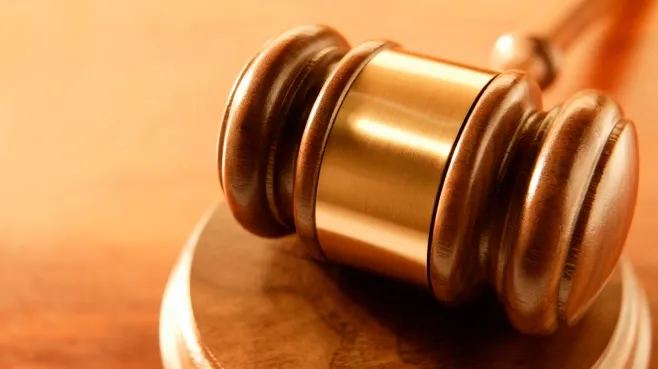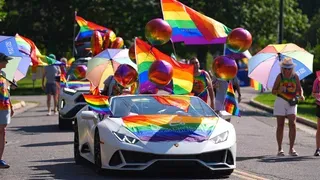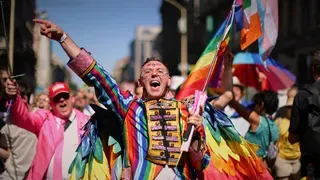March 9, 2013
Drag Queens Plunge Into Icy Boston Harbor to Raise Funds for Domestic Violence Prevention
Dan Meyer READ TIME: 7 MIN.
Domestic violence is a problem that has plagued the community for decades, but one that's rarely discussed due to the lack of resources and crisis assistance offered. In Boston, the newly-branded GLBTQ Domestic Violence Project raised awareness on Mar. 3, when more than 20 people in wild costumes jumped into the icy waters of Boston Harbor to raise money and awareness for the Project.
"We've been on this track for many years," said Curt Rogers, executive director for the GLBTQ Domestic Violence Project, originally the Gay Men's Domestic Violence Project (GMDVP).
Sexual violence and domestic abuse are problems found all around the world, but for some communities, especially the LGBTQ, it's more difficult to seek help. Rogers discovered this firsthand in 2004, when he was turned away from several centers while attempting to flee a domestic murder attempt. The stigma that discourages people from seeking help when they need it most is fueled by this very real fear of being rejected.
Part of the decision to change their name was prompted by the belief that everyone deserves protection from an abusive partner. That's not to say they didn't help non-gay male victims before.
"Our client service side was always fully inclusive," said Rogers. "Due to the fact that we were founded out of my experience being denied services, we never [turned away] anyone who felt more comfortable getting services from us...and that even included heterosexual women and heterosexual men."
Their outreach side was always geared toward whatever their mission, which in 2000, focused solely on gay, bisexual and transgender men. With the name change, Austin Bay, outreach/education manager of the project, said the mission has evolved as well.
"We do need to rebrand ourselves, do new outreach, make sure we're really doing it for the full LGBT community," he told EDGE.
By looking at the organization's old outreach strategies and the segments of the communities with which they were involved, Austin said he discovered conversations were somewhat limited to gay, bisexual and transgender identifying males. Grassroots in origin, the group now plans to use a more diverse group of people in the community to offer resources, help and education.
Passage of VAWA Helps Gays and Lesbians
According to the Centers for Disease and Control, which released a report on intimate partner violence (IPV), "Lesbian women and gay men reported levels of intimate partner violence and sexual violence equal to or higher than those of heterosexuals." Bisexuals also reported higher numbers than their straight counterparts.
In 2011 alone, the National Coalition of Anti-Violence Programs reported 19 IPV homicides, the highest number ever recorded.
During President Barack Obama's State of the Union address on Feb. 12, he called on Congress to pass new measures adding protections for LGBTQ people struggling with domestic violence and sexual abuse from their partners to the Violence Against Women Act (VAWA).
On Mar. 7, he signed the new VAWA, surrounded by survivors of domestic abuse and sexual aggression.
"This victory shows that when American people make their voices heard, Washington listens," Obama said as he signed the bill.
VAWA Adds New Routes to Funding, But Not For LGBTs
With the new provisions come different ways of receiving funding from the government. According to Rogers, the Project now has access to apply for new routes of funding, such as STOP grants. But because of these new protections, some current streams will have to stop.
So, "it's a good thing and a bad thing," Rogers said of the new inclusions.
This is because the group's mission has become too broad to qualify for certain grants that are considered "culturally specific." These used to include the LGBT community, but with the new bill, only ethnicity is considered to fall under this special umbrella of funding.
Asked why the change was made, Rogers said, "It's [impossible] to pin that down on one individual. It goes through so many different committees and players."
He did add that a new stream was created called "underserved populations," in which the LGBT community is included. While this sounds good, Rogers warned that since these programs are brand new, it is unlikely that they'll see any money before the "culturally specific" funds are gone.
When (Not If) Will Sequestration Hit?
While the links between sequestration and LGBT programs have not been fully addressed publicly, Bay and Rogers both admit they're worried about the spending cuts.
"We've been in touch with the majority of our government funds," Bay said, but it seems that there's a lot of confusion as to what's going on. For now, money is locked in thanks to two or three year contracts.
Once it's time to reapply, however, there will be a lot more competition to get grants, since many programs could be cut.
"The bottom line is in this year or the coming year, the sequester is going to affect us financially," Rogers concluded. "It's really muddy right now and when it hits us, it will probably hit us in waves."
Gestures Appreciated, But Action Needed
While everyone at the GLBTQ Domestic Violence Project are appreciative of Obama's efforts, especially for those who are victims of domestic abuse, it's unlikely to change anything in terms of encouraging people to actively seek help.
"It's a nice gesture," Rogers said of Obama's remarks at the State of the Union address. In order to really make LGBT people seeking help, the government needs to act more rather than just speak.
"I don't fault Obama...he's doing a great job," he added. "If people were picking up the phone and talking directly to Obama, they would feel comfortable doing it, but they have to encounter the foot soldiers that still have their institutionalized barriers."
People who might be survivors or just more educated about the issues can add a level of security and strength that might not ever come from the government and federal mandates due to a lack of personal connection.
"I think that what helps make people to feel safe and access services is actually [seeing] LGBTQ people on the ground, raising awareness, talking about LGBTQ domestic violence and sexual assault" said Bay. "Talking about healthy relationships, I think that's really important."
More Than 20 Take the Plunge To Raise Funds
One way of raising awareness happened on Ma. 3, when more than 20 people jumped into the icy waters of the Boston Harbor to raise money and awareness for the Project.
Named the "Winter Plunge," the event had the goal of raising $15,000 and staff members said they easily surpassed that mark. The total count of funds raised is still being tallied.
"It was great!" Rogers said of the event. People dressed up in costumes and celebrated the idea of sharing support for victims and encouraging those who are scared of seeking help."
For more information about the GLBTQ Domestic Violence Project, visit http://gmdvp.org/
Dan Meyer is a young professional whose stories have appeared in publications such as The Advocate online and UCLA's LGBT magazine entitled "OutWrite." He is also a part-time ESL teacher in Boston.







